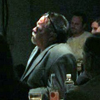New Jersey powerhouse pianist Diane Moser returned to San Diego on Friday night to play one of the most consistently enjoyable shows I’ve seen in years, leading a red-hot ensemble featuring contrabass giant Mark Dresser, saxophonist Hafez Modirzadeh and drummer Vijay Anderson.
Although Moser’s roots with Dresser date back to the 1970s, this band had never actually performed together as a unit, aside from a brief rehearsal immediately preceding the concert, which was held at Dizzy’s in Pacific Beach.
It is a clear testament to the magic possibilities of this music we call jazz that such an event coalesced. Moser’s concert didn’t just feature her own compositions, it also leaned heavily on the pens of Modirzadeh and Dresser who both contributed distinctive and intricate charts that required detailed sight-reading capabilities and superhuman intuitive listening.
She led off the evening with her original, “If You’ll Call Me,” a frenetic freebop anthem where Modirzadeh’s keening alto reminded me of the plaintive cry of Ornette Coleman. Moser pounded jagged, Monk-ian clusters while Dresser and Anderson divided the time into complex multiples. Hearing Dresser play in this context is a joyful experience, and I was instantly attracted to Anderson’s intention and clarity with the ride cymbal, which had amazing focus.
Next up was Modirzadeh’s “Song D,” featuring the composer’s breathy tenor saxophone tracing soft contours of harmony over Anderson’s feathery brushes and Dresser’s pliant throb. Moser has a deft command of pure melodic information that can suddenly veer off into structures of the moment. Dresser was everywhere -- toggling between windmill strums and roiling triplets, his personal sound has a remarkable centering effect.
On Moser’s “Dancing With the Sparrows,” the pianist posited major-key arpeggios against the raw organic bowed harmonics of Dresser as Anderson activated cymbal rolls and Modirzadeh went for a ‘Trane-like reverie. A pensive groove emerged that reminded me of the Keith Jarrett Belonging Quartet – providing Moser with a perfect opportunity to cultivate her cascading melodicism.
Dresser began his provocatively titled original, “I Can Smell You Listening,” alone, coaxing a rich soliloquy from both extremes of his instrument with his bow, and when the rest of the band joined in, it was all about the ability to caress a melody with spiritual gravity. In the blowing sections, a beautiful melange of six releasing into eight surfaced, delineated by Anderson’s uncluttered cymbal pings and Moser’s judicious balance of soft pedal gauze with clanging brutality.
SoundDiego
Music. Community. Culture.
That affinity for dynamic variety also dominated Dresser’s original “M,” which opened with alternate gradients of pizzicato force, exploding into a viscous groove of furious swinging that morphed between a blistering walk and a rather gutbucket half-time, all perfectly shadowed by Anderson, who ratcheted the tension with appropriate waves of volume.
The evening came to a close with Moser’s “For My Mother,” a gorgeous celebration-of-life that unfolded slowly into a labyrinth of expressive emotion -- somehow managing to keep both the melody and the commitment to exploration paramount -- especially on the closing section, when Dresser tuned down to bow an open “D” string as the harmonies faded gently into the night air.
What an amazing night of inspired music.

Robert Bush is a freelance jazz writer who has been exploring the San Diego improvised music scene for more than 30 years. Follow him on Twitter @robertbushjazz. Visit The World According to Rob.




